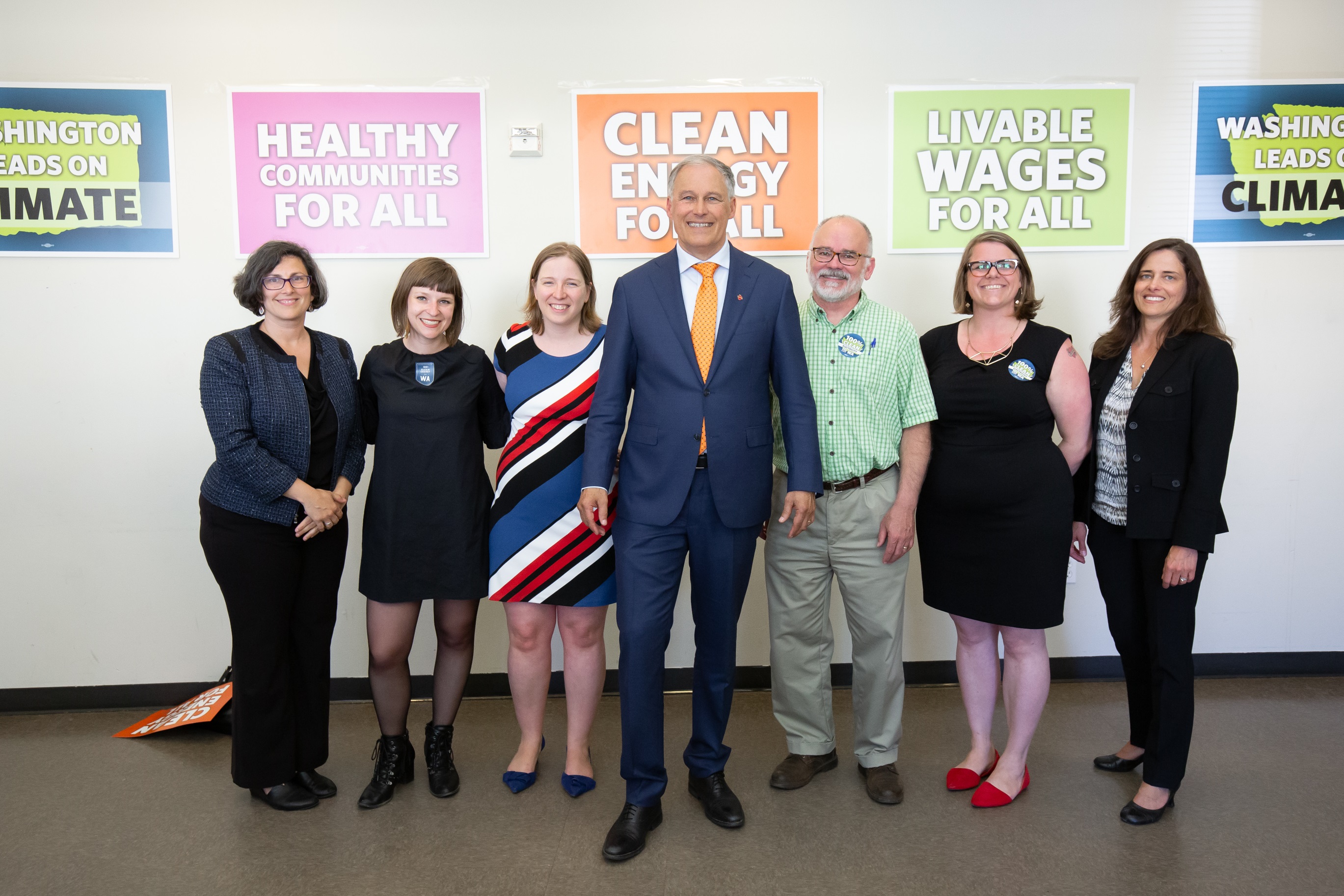Legislative Changes to Existing Energy Programs

Gov. Inslee signed five bills during a bill signing ceremony at Central Park in the Rainier Vista development in Seattle, May 7, 2019: Engrossed Second Substitute House Bill No. 1112. Relating to reducing greenhouse gas emissions from hydrofluorocarbons. Primary Sponsor: Joe Fitzgibbon; Engrossed Third Substitute House Bill No. 1257. Relating to energy efficiency. Primary Sponsor: Beth Doglio; Second Substitute House Bill No. 1444. Relating to appliance efficiency standards. Primary Sponsor: Jeff Morris; Engrossed Second Substitute House Bill No. 2042. Relating to advancing green transportation adoption. Primary Sponsor: Jake Fey; Engrossed Second Substitute Senate Bill No. 5116. Relating to supporting Washington’s clean energy economy and transitioning to a clean, affordable, and reliable energy future. Primary Sponsor: Reuven Carlyle. Commerce energy staff took a moment to snap a photo with the governor after the event.
By Glenn Blackmon, Ph.D.
The 2019 Legislature adopted some big new energy policies – notably the clean electricity standard and the performance standard for existing commercial buildings – but it also made important changes to Washington’s existing energy laws. These are summarized here, and more information is available by reading the bill reports prepared by legislative staff.
Power Source Disclosure (Fuel Mix)
Engrossed Substitute House Bill 1428 reforms the fuel mix statute enacted in 2000. Rep. Sharon Shewmake (D-Bellingham) sponsored the bill at the request of Commerce.
This law requires that electric utilities disclose to their customers the fuels used to generate their electricity. Commerce requested this legislation to make much-needed updates to the law and to improve the accuracy and timeliness of the reports. They worked with utility and environmental stakeholders to develop the legislation, and it was approved without dissent in either legislative chamber.
For utility customers, the biggest change will be a new category on the disclosure label for “unspecified sources”. Utilities do not always know the sources when they purchase electricity, and the existing law required that Commerce assign fuel shares to this power. Instead, unknown sources will simply by listed as a separate category.
The law makes other less obvious but important changes to the integrity of utility disclosures. Utilities will be required to include known energy sources, and utilities are not allowed to make renewable energy claims if they have transferred or sold the renewable energy certificates associated with that electricity.
Appliance Standards
Second Substitute House Bill 1444 adopts new efficiency standards and a design requirement for various energy and water-using products. This bill was requested by Commerce and sponsored by Rep. Jeff Morris (D-Anacortes). Sen. Reuven Carlyle (D-Seattle) sponsored the Senate version.
This was the first update to Washington’s appliance standards since 2009, and the bill adds standards for 17 products. Commerce estimated that consumers and businesses will save $2 billion, net present value, during the first 15 years these standards are in effect. The bill also deleted standards that have been replaced by federal standards during the past decade.
With so many products covered by the bill, Commerce staff needed to work closely with a large group of stakeholders. This group included multiple manufacturing trade associations, environmental and consumer groups, and business interests. At one hearing, legislators marveled at seeing Commerce joined by the Sierra Club and the Association of Washington Business in support of the bill. Most of the new standards apply beginning in 2021, but in some cases, the Legislature approved later dates requested by manufacturers.
Energy Independence Act
Engrossed Second Substitute Senate Bill 5116 is primarily the 100 percent clean electricity bill, but sections 28 and 29 amend the renewable energy standard in the Energy Independence Act (also known as Initiative 937). The main change is to expand the eligibility of hydroelectric generation to include incremental generation from federally owned projects, such as the Grand Coulee Dam. As originally enacted by voters, the law allowed utilities to count incremental generation from hydro projects owned by the retail utilities but excluded federal projects. This change will allow utilities that rely primarily on the Bonneville Power Administration to reduce the number of renewable energy certificates (RECs) used for compliance.
The legislation also includes reforms that Commerce requested to improve the system of tracking use of RECs. The bill adopted an industry-standard definition for RECs, allows hydropower to be tracked and verified using RECs, and clarifies the requirement to retire RECs when they are used for compliance. These changes address an increasing level of confusion about REC eligibility and procedures, without making any substantive changes in resource eligibility.
